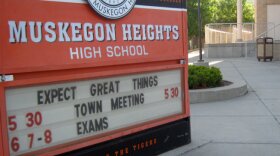State officials and the Muskegon Heights School Board are trying to figure out how they’ll be able to pay staff for the rest of this school year, although the district’s emergency manager is “confident” they’ll work something out.
Muskegon Heights Schools’ emergency manager, Gregory Weatherspoon, says Mosaica Education Inc., the charter company that’s running the school system, has helped cover payroll for months. He says Mosaica has been covering the first paycheck issued in the month, while state aid payments covered the second paycheck. He says the company didn’t, or couldn’t, do that last month.
“It was a timing issue for a while and then there was a lack of funds – a shortage of funds in the budget,” Weatherspoon said.
Payroll is roughly $250,000 every two weeks. State aid payments vary by month, but are roughly $600,000. However, Michigan Treasury Department spokesman Terry Stanton says the amount is reduced to $455,000 after debt obligations.
The state stepped in to pay teachers last week, fronting the district $231,000 from the state aid check the district is to receive April 20.
The school board had a special meeting planned Tuesday night at 6 p.m. at the high school to discuss the ongoing cash-flow problems, but school officials Tuesday morning say that meeting has been canceled.
Mosaica CEO Michael Connelly was not available for comment by deadline Friday, despite repeated attempts to reach him last week. Charter school board officials declined to comment through the board’s attorney.
Mosaica did issue a written statement, which read in part:
The Board and Mosaica Education, which manages the schools, have been working with lenders and the state to finalize permanent financing to fund the investment. To facilitate those efforts, the Michigan Finance Authority provided short-term financing last summer (much of which has already been repaid), and Mosaica agreed to waive its fees and to provide a line of credit, which has been utilized to fund payroll for the past few months. Those funding sources have been exhausted, and efforts to finalize permanent financing were not completed in time to meet Monday’s payroll.
Asked who should be held accountable for the district’s ongoing deficit, Stanton said Weatherspoon, the charter school board, the original school board, the treasury department and Mosaica are all responsible.
State Superintendent Mike Flanagan reportedly made the decision to advance state aid to cover payroll. Michigan’s Department of Education directed requests for comment on the situation to Stanton.
The new charter school system in Muskegon Heights is unusual. It was set up in June 2012 after the old district went broke and the state sent in an emergency manager. The previous emergency manager, Don Weatherspoon, felt the setup was the only option to keep schools open. Gregory Weatherspoon, Don’s brother, was appointed emergency manager in October 2013. Don Weatherspoon left to be a consent agreement consultant at Pontiac schools.
“People have bits and pieces of the story and the whole story is very complicated and you’ve got to kind of be in the midst of it to even understand it because it’s so different than a traditional system,” Gregory Weatherspoon said.
The district planned to have hundreds more students than it did both its first school year and the current school year. The amount of money a school district gets is based primarily on the number of students enrolled.
“All we did was put guesstimates on paper. The guesstimates did not come out in our favor because they came out in the negative and also the students didn’t come out in the abundance that we thought they would,” Gregory Weatherspoon said.
He says the School Board didn't adjust the budget to reflect the lower enrollment. The charter district ended last school year with a nearly $600,000 deficit, according to an independent system audit.
“We’re doing all that right now. You just can’t do it yesterday because you found out today. We’re doing this all for next year,” Weatherspoon said.
But Terry Stanton says that’s something that the state is pushing the district to do much sooner.
“That’s one of the areas that’s proven to be a little bit difficult, is getting to the point where the expenditures are much more closely matched to the revenues, which means then that you’re not overspending,” Stanton said.
“At this point, no solution has been finalized, for lack of a better term. We’re continuing to explore the potential options and we’re going to continue to monitor the situation going forward but at this point we expect payroll to be covered,” Stanton said.
Weatherspoon says higher building repair costs also added to the deficit. The district’s four buildings still have only temporary occupancy permits from the state’s Department of Licensing and Regulatory Affairs. Those permits have been renewed for two years. The current permit is good through the end of the school year.
With the lower student count, Weatherspoon says the district may need to consolidate school buildings. He says the charter system had hoped to attract more students and "max out" the four buildings it has.
Weatherspoon says there are more special education students and higher costs associated with educating them than expectedas well.
He and Stanton praised teachers and staff for continuing to work last week, despite the delayed paycheck. Weatherspoon and Mosaica officials also noted students have made academic gainsunder the new system.













